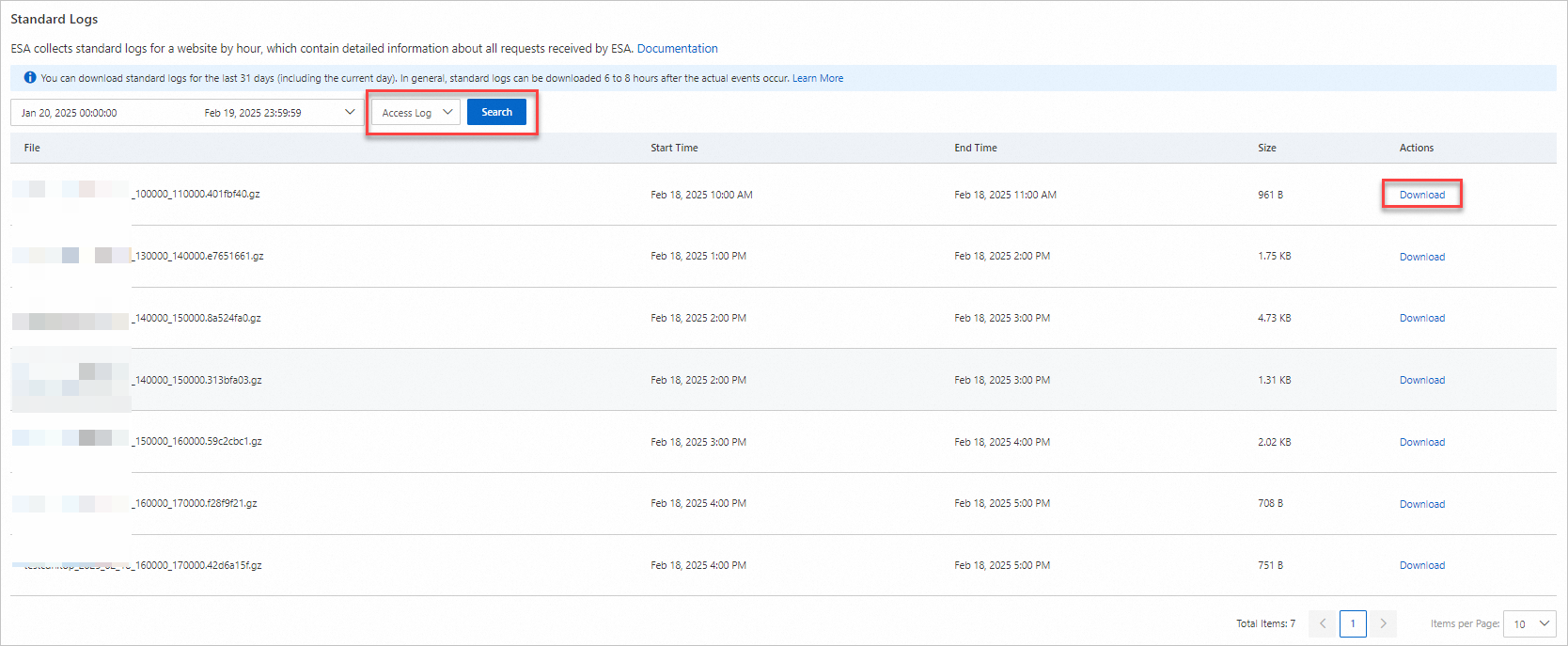Edge Security Acceleration (ESA) provides a standard log service that packages logs hourly. You can download site access logs for any time period within the last 31 days and save them locally. These logs help you optimize the acceleration policy for your site, monitor and diagnose potential issues, and understand user access behavior.
Notes
Standard logs are collected from all ESA points of presence (POPs) on the network. The data has a latency of 6 to 8 hours. Each log record generated in the list is a complete log package for the specified time period. You can click Download to view the log package.
Standard logs support two log types: Access Log and TCP/UDP Proxy Log. By default, these logs are packaged hourly. If your site receives no requests within an hour, no log package is generated for that hour.
Log packages are compressed into the
.gzformat using gzip. The file naming convention issite_name_year_month_day_start_time_end_time.xx.gz. For example,aliyundoc.com_2024_01_01_000000_010000.xx.gz.
Download standard logs
In the ESA console, click Websites. In the Website column, click the target site.
In the left navigation pane, choose .
On the Standard Logs page, select a time range and log type, and then click Search.
Find the log record that you want to download and click Download in the Actions column. After the download is complete, decompress the file to view the logs.
 Note
NoteYou can download logs for the past 31 days, including the current day, from the console. To download logs that are older than 31 days, you can submit a ticket to retrieve logs from the past 180 days.
Standard log fields
Access Log
Field name | Data type | Description |
ClientASN | string | The autonomous system number (ASN) information parsed from the client IP address. |
ClientIP | string | The IP address of the client that established a connection with the ESA POP. |
ClientRequestID | string | The unique identifier of the client request. |
ClientRequestScheme | string | The |
ClientISP | string | The carrier information parsed from the client IP address. |
ClientCountryCode | string | The ISO-3166 Alpha-2 code parsed from the client IP address. |
ClientRegionCode | string | The ISO-3166-2 code parsed from the client IP address. |
ClientRequestBytes | int | The size of the client request, in bytes. |
ClientRequestHeaderRange | string | The value of the |
ClientRequestHost | string | The |
ClientRequestMethod | string | The |
ClientRequestProtocol | string | The protocol information of the client request. |
ClientRequestReferer | string | The |
ClientRequestURI | string | The |
ClientRequestUserAgent | string | The |
ClientSrcPort | int | The port used by the client to establish a connection with the ESA POP. |
EdgeCacheStatus | string | The cache status of the client request. |
EdgeResponseBodyBytes | int | The size of the response body that the ESA POP returns to the client, in bytes. |
EdgeResponseBytes | int | The size of the response that the ESA POP returns to the client, in bytes. |
EdgeResponseStatusCode | int | The status code that the ESA POP returns to the client. |
EdgeServerID | string | The unique identifier of the ESA server that the client accessed. |
EdgeServerIP | string | The IP address of the ESA POP. |
EdgeStartTimestamp | Timestamp ISO8601 | The timestamp when the ESA POP received the client request. For example, 2024-01-01T00:00:00+08:00. |
EdgeTimeToFirstByteMs | int | The time from when the ESA POP receives a client request to when the ESA POP returns the first byte of the response to the client, in ms. |
SiteName | string | The site name. |
TCP/UDP Proxy Log
Field name | Data type | Description |
BlockRuleID | string | The ID of the rule that was triggered for interception and protection. If this field is empty, the request was not intercepted. |
ClientASN | string | The autonomous system number (ASN) information parsed from the client IP address. |
ClientBytes | int | The number of data bytes received from the client, in bytes. |
ClientCountryCode | string | The ISO-3166 Alpha-2 code parsed from the client IP address. |
ClientIP | string | The IP address of the client that established a connection with the ESA POP. |
ClientISP | string | The carrier information parsed from the client IP address. |
ClientMatchedIpFirewall | string | The type of the matched IP access rule. |
ClientPort | int | The client port. |
ClientProto | string | The data transmission protocol of the client. |
ConnectTimeStamp | Timestamp ISO8601 | The timestamp when the client established a connection with the ESA POP. For example, 2024-01-01T00:00:00+08:00. |
DisconnetTimeStamp | Timestamp ISO8601 | The timestamp when the client disconnected from the ESA POP. For example, 2024-01-02T00:00:00+08:00. |
DomainName | string | The domain name of the application instance. |
EdgeServerIP | string | The IP address of the ESA POP. |
IpFirewall | bool | Indicates whether the IP access rule is enabled. |
LogTimeStamp | Timestamp ISO8601 | The timestamp when the log was generated. For example, 2024-01-01T00:00:00+08:00. |
OriginBytes | int | The number of data bytes received from the origin server, in bytes. |
OriginIP | string | The IP address of the origin server. |
OriginPort | int | The port of the origin server. |
OriginProto | string | The data transmission protocol of the origin server. |
ProxyProtocol | string | The version of the proxy protocol. Values include off, v1, and v2. |
SessionID | string | The globally unique stream identifier. |
SiteName | string | The site name. |
Status | int | The status code at the end of the session. |